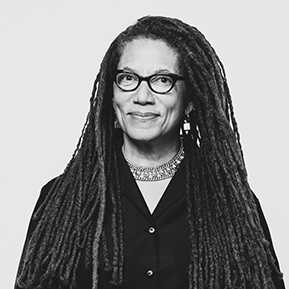The Inflammation
The air in the high school is swollen. My heart balloons
as I smooth my name tag down. The woman checking
me in at Austin East Magnet High School has a warning,
“They might not have much to say.”
I have not come to measure their verbs or their vowels.
My vested interest is their red blood cells. East Knoxville,
where six students in one year, from one high school,
are dead by gun violence.
As I walk to Ms. Hall’s young writers class, 16-year-olds
with the mud-red beauty of the Maasai fly past me in the
hall late for class. There are no visible signs of bruising.
A blood test could reveal the damage done these last 400
years. A blood test is a fine modern measurement of the
homocysteine levels moving through precious growing
creative bodies. There are no blood tests in my bag and I
only have one hour to measure what I have traveled here
to know. East Knoxville, fifty years before, every grocery
store, bakery, doctor’s office, barbershop, pharmacy, juke
joint, Miss Lucille Reader of Palms, closed down and laid
to rest on the new Civic Center pyre. Blood sugar levels
bought season tickets to the Moon. Families on the East
side came to know American architecture intimately, how
the right side of Martin Luther King, Jr. Boulevard arced
into the halls of the high school, and the left side dangled
at the front door of Jarnigan & Son Mortuary, oldest Black
business in town. A swelling is how the body begins to heal.
A blood test can be historical marker for the inflammation
of disparity. My ballooning heart enters the door of their
A, B, and O world. I am met by 14 framed faces of curious
encyclopedic sunlight. Their Wolof and Benin mouths follow
me around the room like awakened cicadas. I ask them to read.
They stop buzzing, mid-air, hold their patterns, wondering
if I have come to take something else from them. The one
in perfect white sneakers with BEATS dangling off his ears
keeps his head under his hoodie. The two by the window
use the glass as dream portal, watching, then aiming, their
father’s eyes farther out into the rising Blue Ridge Mountain
light settling the pitched roof of Jarnigan & Son. The room
is a clover field of hide, luck, and chance, but the burning
tenderness of their inflammation wants out. Inflammation
is a fight response from the body when the immune system
leaps into action even when there is no visible injury. Angelina
extends her grey tablet out to me. Her dark Motown eyes
begin their return to Earth. I read her poem as if it belongs
in my mouth. Their words reach and ricochet. My immune
system kicks in just as Jamartray decides I might be worthy,
handing me his fragile worry-filled word rope, his mother’s
Lindy Hop, in and out of the Double-Dutch rope of illness.
Shiasia’s spunky Afro-Latin is read with Black girl attitude
kept under my tongue for moments when the fear in their
eyes is molten and strawberry. She cheers. Leonard begins
with a piercing refusal to never be a statistic and ends with
his mother’s double helix—HeLa—never-ending cells of
extraordinary love alighting every face in the room. It is
9:00 am on a Friday morning in East Knoxville. I have lost
my tally and count. The young poets have broken my fever.
Copyright © 2022 by Nikky Finney. Originally published in Poem-a-Day on August 24, 2022, by the Academy of American Poets.
“In March of 2022, I was invited to read poetry with the cellist Tomeka Reid at the Big Ears Festival in Knoxville. While there, I was also asked to spend some time in the community with young poets. I am drawn to these kinds of invitations because I never know what I will find in the human mix. I had no idea I was walking into a high school that was in the process of moving through the trauma of having lost six of its students to gun violence in only one year. It was a moment of great power and levitation for me. I realized, as I walked away, that what this country refuses to do for them, help save their lives, they were doing for themselves; and, for me, by way of their astounding, unflinching, blood-orange words.”
—Nikky Finney

